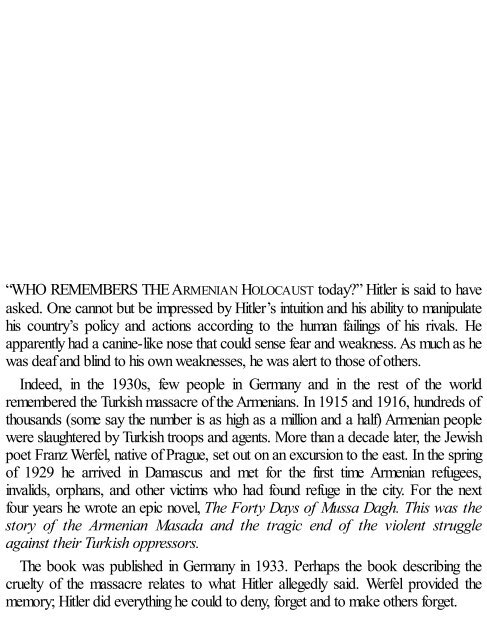- Page 5:
THE HOLOCAUST IS OVER; WE MUSTRISE
- Page 8 and 9:
THE HOLOCAUST IS OVER; WE MUST RISE
- Page 10 and 11:
In loving memory of my late parents
- Page 12 and 13:
Notes 243Index 247
- Page 14 and 15:
none of this could have happened.An
- Page 16 and 17:
word “former” is attached to yo
- Page 18 and 19:
This is how I explain the fierce pu
- Page 20 and 21:
eternal renewal of the world. But n
- Page 22 and 23:
CHAPTER 1
- Page 24 and 25:
I WAS BORN IN JANUARY 1955 IN GERMA
- Page 26 and 27:
When I finished writing my first bo
- Page 28 and 29:
I had heard her say that more than
- Page 30 and 31:
of my late father. We traveled far
- Page 32 and 33:
CHAPTER 2THE HOLOCAUST, EVER-PRESEN
- Page 34 and 35:
youngest son, Noam, did not join th
- Page 36 and 37:
Bank; New Age and Buddhist experime
- Page 38 and 39:
CHAPTER 3
- Page 40 and 41:
WHERE TO BEGIN? HOW DO YOU START CL
- Page 42 and 43:
ight, and Eban, if the 1967 boundar
- Page 44 and 45:
CHAPTER 4
- Page 46 and 47:
MY NEIGHBOR RAMI’S PARENTS CAME F
- Page 48 and 49:
When he woke up, he continued the c
- Page 50 and 51:
power. The local leadership of Ben
- Page 52 and 53:
How could it be that everything “
- Page 54 and 55:
As the Zionist movement aspired to
- Page 56 and 57:
everything changed dramatically and
- Page 58 and 59:
“Masada will not fall again” be
- Page 60 and 61:
So, three traumatized communities c
- Page 62 and 63:
CHAPTER 5
- Page 64 and 65:
WHAT COLOR WAS THE HOLOCAUST? PROBA
- Page 66 and 67:
seemed to side with me and my frien
- Page 68 and 69:
into ploughshares and wait patientl
- Page 70 and 71:
When my initial courtship of Yael c
- Page 72 and 73:
only during the long incubation per
- Page 74 and 75:
liked to compare the Palestinian Na
- Page 76 and 77:
Fanon is an expert witness worth li
- Page 78 and 79:
prevention.” How targeted could i
- Page 80 and 81:
themselves to speak words that shou
- Page 82 and 83:
followed the war? If not, how did h
- Page 84 and 85:
war, therefore they should not know
- Page 86 and 87:
CHAPTER 6LESSONS FROM THE HOLOCAUST
- Page 88 and 89:
“nationhood,” including its int
- Page 90 and 91:
in anger over the Dreyfus Affair, b
- Page 92 and 93:
1943, upon hearing of the Warsaw gh
- Page 94 and 95:
is compared to the Shoah, dwarfed b
- Page 96 and 97:
ad fortune, to express anger, to re
- Page 98 and 99:
e the cause of constant political f
- Page 100 and 101:
use the refugee problem to denounce
- Page 102 and 103:
Almost everywhere the Shoah serves
- Page 104 and 105:
with the moral parity among the chi
- Page 106 and 107:
CHAPTER 7
- Page 108 and 109:
THE HIGH POINT OF MY SEVENTH GRADE
- Page 110 and 111:
at least, before the Warsaw ghetto
- Page 112 and 113: than a million Jews who had walked
- Page 114 and 115: ebels and the disciples of the yout
- Page 116 and 117: exterminated. A group of Jewish you
- Page 118 and 119: grenade. Natan Rapoport, the sculpt
- Page 120 and 121: we will not respond. We will sacrif
- Page 122 and 123: against Us.” It is self-evident,
- Page 124 and 125: of now we got lost. We need to retu
- Page 126 and 127: CHAPTER 8
- Page 128 and 129: BECAUSE OF ADOLF EICHMANN, I CAN’
- Page 130 and 131: discussion about garbage technology
- Page 132 and 133: gap between my father’s world and
- Page 134 and 135: independent Jewish Commonwealth, th
- Page 136 and 137: Eichmann harmony at the right pitch
- Page 138 and 139: the victors at Nuremberg presented,
- Page 140 and 141: the highest order. Without people l
- Page 142 and 143: The landlady did not lie, and never
- Page 144 and 145: of whom only one was a non-Jew, a g
- Page 146 and 147: The Grunwald trial had become the K
- Page 148 and 149: Canaanite left, and the yearling of
- Page 150 and 151: to shape a new Israeli generation t
- Page 152 and 153: trial . . . he would use expression
- Page 154 and 155: light to humanity. But they continu
- Page 156 and 157: suspended daily, and not just to ev
- Page 158 and 159: minister who came from “there,”
- Page 160 and 161: CHAPTER 9
- Page 164 and 165: . . . an ideologue with firm belief
- Page 166 and 167: Today we are armed to the teeth, be
- Page 168 and 169: and Romanians. We would have shut o
- Page 170 and 171: It turned out that the Dalai Lama,
- Page 172 and 173: War II, an estimated half a million
- Page 174 and 175: An empire without colonies launched
- Page 176 and 177: So familiar and yet so far removed
- Page 178 and 179: was the first governor of southwest
- Page 180 and 181: mention other states, the Jewish wo
- Page 182 and 183: square and deserted the universal h
- Page 184 and 185: peoples’ holocausts. In a world i
- Page 186 and 187: we raise our guests and force-feed
- Page 188 and 189: CHAPTER 10
- Page 190 and 191: JUDAISM IS A CIVILIZATION THAT IS T
- Page 192 and 193: the Jewish Pantheon, namely in the
- Page 194 and 195: dogma are the most dangerously viol
- Page 196 and 197: His words express no condolences an
- Page 198 and 199: most meaningful clash to take place
- Page 200 and 201: Korah’s racism lacks the mechanis
- Page 202 and 203: aka HaRambam. All of them belong to
- Page 204 and 205: lecture, a professor stood up.“I
- Page 206 and 207: The revolution that did not happen
- Page 208 and 209: the deceitful war in Lebanon, for t
- Page 210 and 211: and not in Le Monde, in French? His
- Page 212 and 213:
a new prayer book, a Siddur, in whi
- Page 214 and 215:
CHAPTER 11MAKE GOD SMILE AGAIN
- Page 216 and 217:
Does it really matter who is guilty
- Page 218 and 219:
Divine intervention did not come to
- Page 220 and 221:
enemy-brethren? My Shoah question i
- Page 222 and 223:
wept, and kept watch; but when the
- Page 224 and 225:
acceptance of those who were discri
- Page 226 and 227:
and impatient beliefs win over many
- Page 228 and 229:
Chinese tyranny.The sum total point
- Page 230 and 231:
—Karl Marx, Leon Trotsky, Sigmund
- Page 232 and 233:
and outlooks. It was not just a dif
- Page 234 and 235:
CHAPTER 12
- Page 236 and 237:
HOW MANY TIMES SHOULD A MAN DIE? H
- Page 238 and 239:
Israelis made a motion. So I starte
- Page 240 and 241:
innovation that included my sister
- Page 242 and 243:
heard this melody at any other home
- Page 244 and 245:
nations that do not know you and on
- Page 246 and 247:
I never made secret of my opinion t
- Page 248 and 249:
admissible. I am sorry, but this do
- Page 250 and 251:
prime minister with Germany’s pre
- Page 252 and 253:
only synagogue where the cantor Mei
- Page 254 and 255:
3. An official press release by Net
- Page 256 and 257:
6. Yehuda Elkana, “In Defense of
- Page 258 and 259:
INDEXAbraham, 107, 158, 178, 184, 2
- Page 260 and 261:
British Mandate of Palestine, 99-10
- Page 262 and 263:
faith, 206-9, 211, 213, 240Finkielk
- Page 264 and 265:
198, 203-16, 226, 231-3, 239; color
- Page 266 and 267:
Jonas, Hans, 205-6Jordan, 67, 82-3,
- Page 268 and 269:
Namibia, 161-5, 174Napoleon III, 52
- Page 270 and 271:
Rwanda, 86, 144, 151-2, 155, 158, 1
- Page 272 and 273:
Ukraine, 29, 32, 36, 74United Natio













